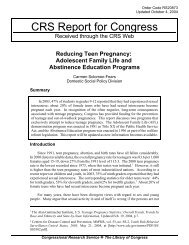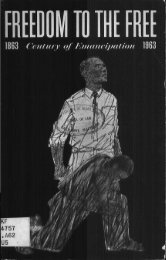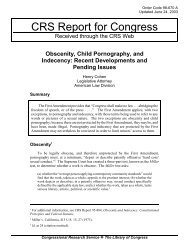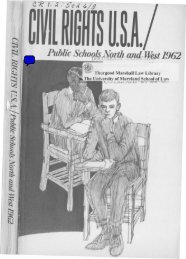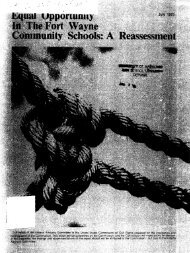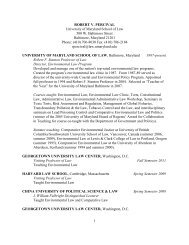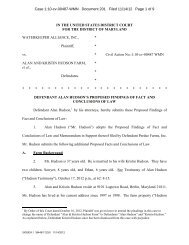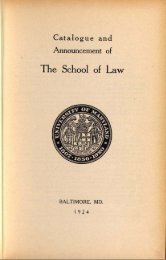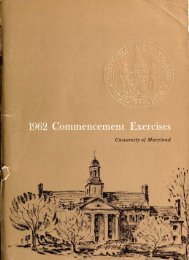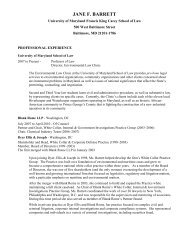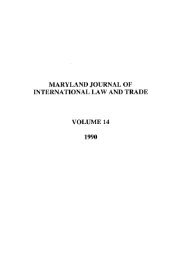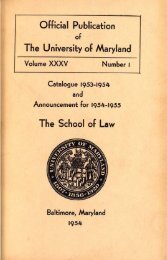University of Maryland School of Law : Catalog, 1988-1989
University of Maryland School of Law : Catalog, 1988-1989
University of Maryland School of Law : Catalog, 1988-1989
Create successful ePaper yourself
Turn your PDF publications into a flip-book with our unique Google optimized e-Paper software.
<strong>Law</strong> and Literature Seminar*<br />
(3) and/or Course (2)<br />
The seminar will examine a few<br />
major "legal novels" (literary classics<br />
with law as subject matter),<br />
and the growing body <strong>of</strong> theoretical<br />
writings regarding the<br />
nature <strong>of</strong> interpretation, and the<br />
relationship (if any) between the<br />
legal and literary interpretive enterprise.<br />
Each student will be required<br />
to write and present a paper centering<br />
on a work <strong>of</strong> legal literature,<br />
or alternatively, on some aspect <strong>of</strong><br />
the interpretation debate. A<br />
limited number <strong>of</strong> students will be<br />
permitted to take the seminar as a<br />
two-credit course with a required<br />
final exam but no paper.<br />
The seminar will have three<br />
parts. Part I will examine several<br />
legal novels, in conjunction with<br />
competing interpretive studies <strong>of</strong><br />
those novels by legal scholars. Part<br />
II will examine the interpretation<br />
debate in jurisprudence, and its increasing<br />
dependence on theories <strong>of</strong><br />
interpretation borrowed from literary<br />
theory. Part III will evaluate<br />
this growing interdisciplinary field,<br />
and compare it with its closest interdisciplinary<br />
rival: the law and<br />
economics movement.<br />
Evening (LAW 589 G)— Ms. West.<br />
<strong>Law</strong> and Medicine (2)<br />
This course serves as an introduction<br />
to legal issues in medical practice<br />
and health care. Such areas to<br />
be explored may include medical<br />
education; licensure; pr<strong>of</strong>essional<br />
discipline; hospital privileges; the<br />
physician-patient relationship;<br />
medical records and confidentiality;<br />
informed consent; special<br />
problems <strong>of</strong> the minor patient;<br />
AIDS and public health policy;<br />
death and dying; and medical malpractice.<br />
Day/Evening (LAW 567 C) at<br />
4:30 p.m.—Ms. Rothenberg.<br />
<strong>Law</strong> and Psychiatry Seminar*<br />
(3)<br />
The law has an increasingly important<br />
place in the practice <strong>of</strong> psychiatry.<br />
Commitment, the right to<br />
treatment, the right to refuse treatment,<br />
release <strong>of</strong> insanity acquitees,<br />
Taras<strong>of</strong>f warnings and malpractice<br />
are a few <strong>of</strong> these areas. This seminar<br />
will discuss these issues in a<br />
medico-legal clinical fashion. A<br />
paper will be required.<br />
Day (LAW 566 C)—Not <strong>of</strong>fered<br />
<strong>1988</strong>-89.<br />
<strong>Law</strong> and Psychology Seminar*<br />
(3)<br />
This course explores the interplay<br />
and conflict between law and psychology.<br />
One major component is<br />
a survey <strong>of</strong> how psychological research<br />
and theory might affect the<br />
judicial decision-making process in<br />
such areas as children's rights,<br />
obscenity, desegregation, the right<br />
to counsel and freedom <strong>of</strong> expression.<br />
A second major component<br />
focuses on the psychologist as<br />
the object <strong>of</strong> judicial scrutiny. In<br />
this regard the course includes materials<br />
on constraints on behavioral<br />
science research, therapeutic intervention<br />
and the use <strong>of</strong> psychological<br />
tests and the vulnerability <strong>of</strong><br />
the psychologist as expert witness.<br />
The course is open to students at<br />
the <strong>School</strong> <strong>of</strong> <strong>Law</strong> and psychology<br />
students at the Johns Hopkins <strong>University</strong>.<br />
Day (LAW 526 D)—Not <strong>of</strong>fered<br />
<strong>1988</strong>-89.<br />
Legal and Social Problems <strong>of</strong><br />
the Elderly (3)<br />
This course will focus on several <strong>of</strong><br />
the major legal and social problems<br />
confronting the elderly today.<br />
These include public benefits; eg.<br />
Medicaid and Medicare; planning<br />
for old age, i.e., wills, insurance,<br />
and annuities; dealing with the<br />
health care system: rights <strong>of</strong> nursing<br />
home and hospitalized patients;<br />
and substituted decisionmaking for<br />
elderly incompetent patients, i.e.,<br />
guardianship, durable powers <strong>of</strong> attorney<br />
and living wills. The course<br />
will integrate substantive and skill<br />
building components by providing<br />
students with an opportunity to<br />
(1) interact with elderly individuals,<br />
(2) practice interviewing,<br />
counseling, writing and oral communication<br />
skills, and (3) learn<br />
about and appreciate the roles <strong>of</strong><br />
other pr<strong>of</strong>essionals involved in<br />
providing services to the elderly.<br />
Although the course will be targeted<br />
to law students, three or four<br />
<strong>of</strong> the sessions will be held jointly<br />
with a class at the school <strong>of</strong> social<br />
work and students from both<br />
schools will have an opportunity to<br />
work together on a project outside<br />
<strong>of</strong> class. Students may take this<br />
course and Legal Problems <strong>of</strong> the<br />
Elderly Seminar.<br />
Day (LAW 532 D)— Ms. H<strong>of</strong>fman.<br />
83



